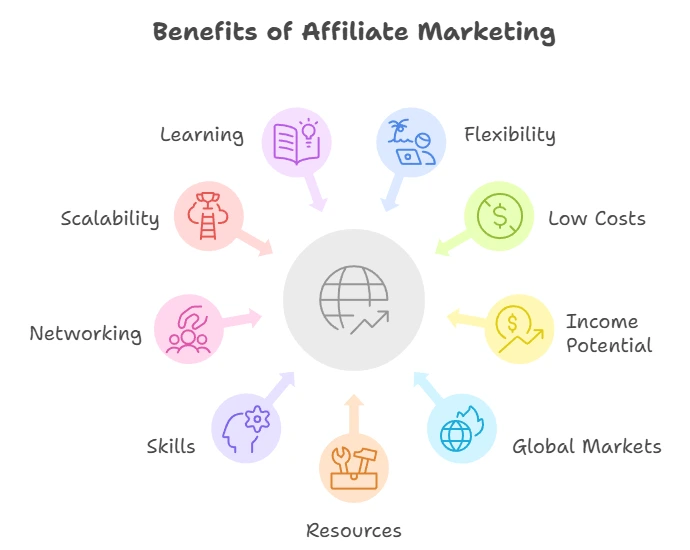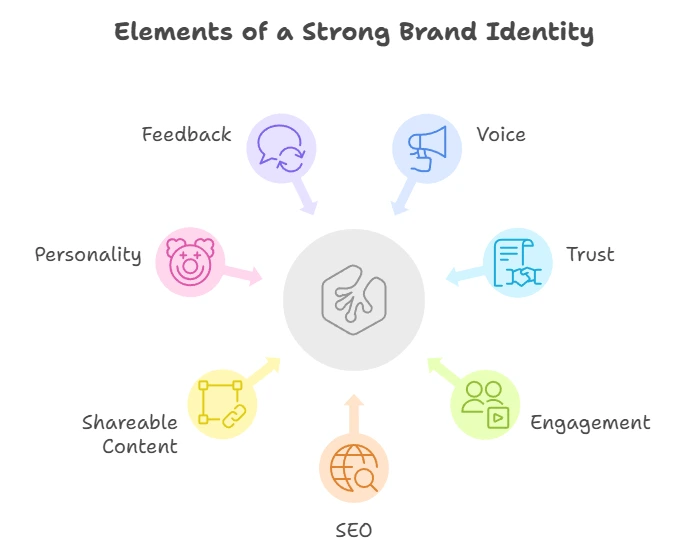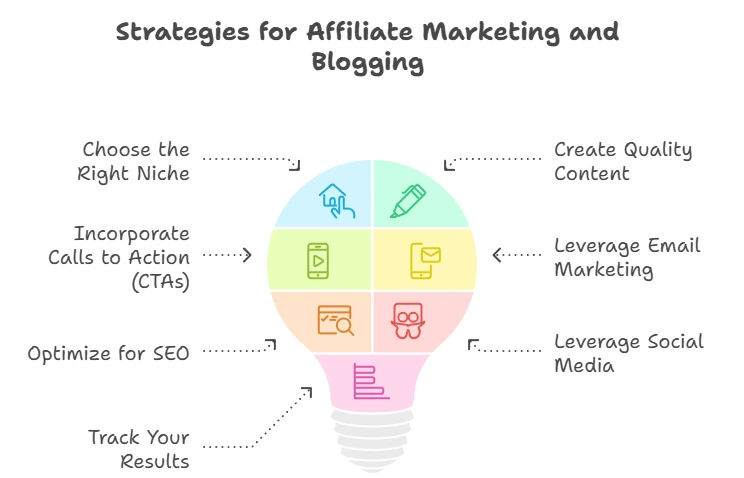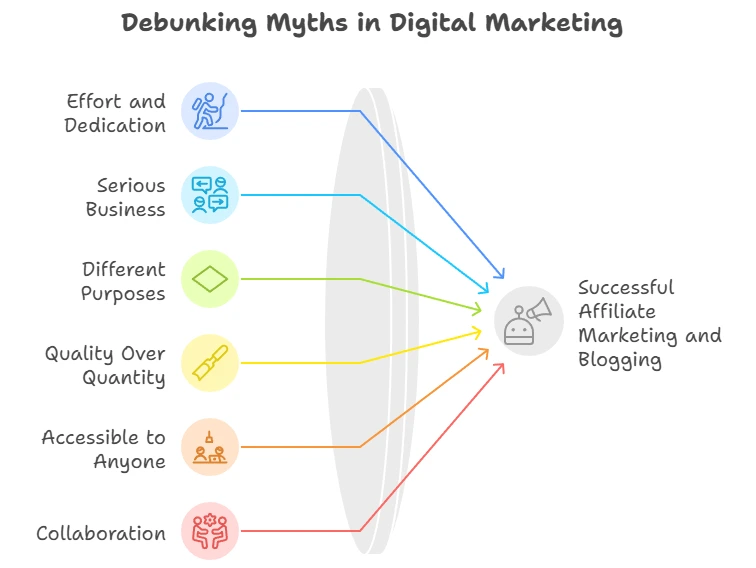 ATTENTION: Want to Learn Affiliate Marketing from Successful Affiliates?
Join this FREE community where successful marketers share their secrets!
Learn directly from highly successful affiliate marketers
Access free, actionable training content regularly
Connect with an active community of over 5,000 members
Network with multiple six-figure earning affiliates
Get your questions answered by real experts
JOIN FREE NOW!
ATTENTION: Want to Learn Affiliate Marketing from Successful Affiliates?
Join this FREE community where successful marketers share their secrets!
Learn directly from highly successful affiliate marketers
Access free, actionable training content regularly
Connect with an active community of over 5,000 members
Network with multiple six-figure earning affiliates
Get your questions answered by real experts
JOIN FREE NOW!
Deciding between Affiliate Marketing Vs Blogging can feel overwhelming, especially if you’re looking to earn money online. Both avenues offer exciting opportunities for income, but they work in different ways. Understanding their distinct features can help you make an informed choice.
What is Affiliate Marketing?
Affiliate marketing involves promoting other people’s products or services and earning a commission for every sale made through your referral. It’s a performance-based model where your earnings depend on how well your promotions convert into sales. Here are some essential aspects of affiliate marketing:
- Low Starting Costs: You don’t need to create your own product. You can focus purely on marketing.
- Diverse Income Streams: You can promote various products from different companies, increasing your potential earnings.
- Performance Tracking: Most affiliate programs provide tools to track your clicks, conversions, and commissions.
- Flexible Work Hours: You set your schedule while promoting products that align with your audience’s interests.
What is Blogging?
Blogging involves writing content regularly on a specific niche or subject. The primary goal is to engage an audience and often monetize that engagement through different methods, including affiliate marketing, ads, and sponsored posts. Let’s explore some aspects of blogging:
- Content Creation: You have complete control over the topics you write about and have the opportunity to showcase your expertise.
- Building a Loyal Following: Blogging helps you create a relationship with your readers, which can lead to a dedicated audience.
- Monetization Options: Besides affiliate marketing, you can also earn money through ads, services, or digital products.
- Creative Expression: Blogging gives you a platform to share your thoughts, ideas, and skills while connecting with like-minded individuals.
Comparing Affiliate Marketing vs Blogging
While Affiliate Marketing Vs Blogging can overlap, they serve different purposes and can appeal to various skill sets. Here’s a side-by-side comparison:
| Feature | Affiliate Marketing | Blogging |
|---|---|---|
| Skill Set | Marketing, promoting | Writing, content creation |
| Setup Time | Quick to start | Time-consuming (research, writing) |
| Revenue Potential | Direct sales commission | Multiple income streams |
| Audience Engagement | Limited to conversion-driven | Relationship-building |
| Control Over Content | Limited to promotions | Complete control |
Which is Right for You?
Your choice depends on your goals, skill set, and available time. Here are some tips for determining which path may suit you better:
- If you enjoy writing and have a passion for sharing ideas, blogging might be the better choice. It allows you to connect with an audience and provides various monetization options.
- If you prefer focusing on marketing and driving sales, then affiliate marketing can be more appealing. It requires less content creation and could lead to quicker financial gains.
- Consider combining both. Many bloggers leverage affiliate marketing within their content, turning their blogs into revenue-generating platforms.
Deciding between Affiliate Marketing Vs Blogging is ultimately about what you enjoy and what fits your lifestyle better. Both routes have the potential for profit and creativity, so consider experimenting with both before making a long-term commitment.
For further insights into affiliate marketing, you can visit Shopify and for blogging tips, check out Neil Patel’s blog.
The Unique Benefits of Affiliate Marketing for Income Generation

Affiliate marketing stands out as a powerful method for income generation. It’s especially appealing if you’re looking to create a flexible source of revenue while leveraging existing products, services, and audiences. One of its primary advantages lies in the minimal barrier to entry, allowing anyone with an internet connection to start earning.
Flexibility and Freedom
One of the most attractive aspects of affiliate marketing is the flexibility it offers. You have the freedom to work from anywhere, at any time. This means that you can integrate it seamlessly into your lifestyle. Here are a few points regarding the flexibility it presents:
- You can choose your own working hours.
- There’s a wide variety of niches to focus on.
- You don’t need to hold inventory or manage products directly.
Low Start-Up Costs
Launching a traditional business can require substantial financial investment. However, affiliate marketing allows you to start with very little money. You won’t have to invest in product creation, inventory, or shipping. Just a website, blog, or social media channel can serve as your platform. This dramatically lowers the financial risks typically associated with starting a business.
Income Potential
Another unique benefit of affiliate marketing is the impressive income potential. As you delve deeper into this model, you can earn substantial commissions. Here’s how this can play out:
- Commissions on Sales: Many programs pay a percentage of each sale made through your referral link. This can lead to significant payouts, particularly with high-ticket items.
- Recurring Earnings: Some affiliate programs offer subscription services, allowing you to earn recurring commissions each month.
Access to Global Markets
In a digital age, your audience is not limited to your local area. With affiliate marketing, you can reach potential customers worldwide. This requires minimal effort; just a well-crafted online presence can attract and convert people from various locations.
Leveraging Resources and Expertise
When you engage in affiliate marketing, you’re often promoting established products and services. This means you benefit from their existing marketing efforts and brand recognition. You don’t need to create the product or service; your focus is on marketing it effectively. Here’s an overview:
- You can choose from a variety of reputable companies to partner with, such as Amazon Associates.
- Established brands typically offer better conversion rates because they’re trusted by consumers.
Building Valuable Skills
Affiliate marketing allows you to hone a variety of skills. As you progress, you’ll learn about SEO, content marketing, digital advertising, and social media strategies, to name a few. These skills are not only valuable in the affiliate space but can be beneficial in multiple areas of your professional life.
Networking Opportunities
Engaging in affiliate marketing also opens doors for networking with other marketers and professionals in your niche. Through forums, social media groups, or events, you can forge relationships that may lead to collaborations or new opportunities.
Scalable Business Model
As you become more adept, you can scale your affiliate marketing efforts. With the right strategies in place, there’s no cap on how much you can earn. You can diversify your channels, explore new niches, or promote a wider variety of products. Examples of how to scale include:
- Creating multiple websites targeting diverse niches.
- Utilizing paid advertising to drive more traffic to your affiliate links.
Continuous Learning and Adaptation
The digital landscape is ever-changing. As an affiliate marketer, you must stay updated with trends and shifts in consumer behavior. This commitment to continuous learning not only helps you adapt but also keeps your marketing strategies relevant and effective. Resources like Neil Patel and Backlinko are instrumental for learning and refining your strategies.
In sum, affiliate marketing offers a unique path to income generation. With low start-up costs, flexibility, and the potential for high earnings, it presents an attractive option for many entrepreneurs. Embracing this model could lead you towards achieving both financial goals and personal fulfillment.
How Blogging Creates a Stronger Brand Identity

In today’s digital landscape, having a strong brand identity is crucial for businesses and individuals alike. One of the most effective ways to achieve this is through blogging. Blogging allows you to connect more deeply with your audience, showcase your expertise, and create a unique voice that resonates with your brand. Here’s how blogging can strengthen your brand identity.
Establishing Your Voice
A blog serves as a platform where you can express your thoughts, ideas, and values. By consistently sharing content that aligns with your brand’s mission, you can develop a distinct voice. This, in turn, helps you build a connection with your audience. When readers feel they understand your perspective, they’re more likely to trust your brand. A unique voice can also differentiate you from competitors, making you more memorable.
Building Trust with Quality Content
Creating high-quality blog posts demonstrates your expertise and commitment to your field. Regularly providing valuable information encourages readers to view you as a thought leader. Over time, this builds trust, which is vital for any brand. Consider sharing:
- How-to guides
- Industry news and insights
- Personal anecdotes
- Useful tips and tricks
When you offer readers something of value, their perception of your brand becomes more positive. They start to associate your brand with knowledge and reliability.
Enhancing Engagement
Engaging content invites conversation. When you write blog posts that evoke emotions or raise questions, your readers are more likely to interact with your content. This engagement can take various forms, such as comments, shares, or social media interactions. For instance:
- Encourage readers to comment by asking questions at the end of your posts.
- Share polls or feedback requests to capture the audience’s opinion.
- Incorporate storytelling to make your content relatable.
These interactions not only strengthen your relationship with your audience but also enhance your brand’s visibility.
Boosting SEO and Online Presence
Search engines reward quality content and regular updates. By blogging consistently, you improve your website’s SEO, making it easier for potential customers to find you. This, in turn, helps solidify your brand’s presence online. Some strategies include:
- relevant keywords naturally into your posts.
- Optimizing images with descriptive alt texts and titles.
- Linking to credible sources and relevant internal pages.
By effectively utilizing these strategies, your blog can help your brand appear higher on search engine results pages, leading to increased organic traffic.
Creating Shareable Content
When you write blogs that educate or entertain, they often get shared on social media. This increases your brand’s exposure and invites new visitors to your site. To enhance shareability:
- Include visually appealing images or infographics.
- Use engaging headlines that spark curiosity.
- Encourage readers to share and tag your brand.
Each share works as a subtle endorsement of your brand, further boosting your reputation.
Showcasing Your Brand Personality
Your blog is a reflection of your brand’s personality. Are you quirky and fun? Professional and serious? This platform allows you to reveal your true nature. Let your authenticity shine through your posts. Highlight what makes your brand unique, whether it’s your mission, culture, or the people behind it. This clarity draws the right customers to you, those who align with your values.
Tracking Feedback and Adapting
Blogs also provide insights into what your audience wants. Monitoring comments, social shares, and page views can help you understand which topics resonate. Use this data to adapt your content strategy accordingly. By listening to your audience, you can create a more personalized experience that aligns with their needs.
Additional Resources
For those looking to enhance their blogging strategy, consider visiting:
Utilizing your blog effectively can lead to a more robust brand identity. By establishing a clear voice, building trust, engaging your audience, enhancing SEO, and showcasing your personality, blogging becomes an essential tool in crafting a powerful brand. The journey may take time, but with dedication, the benefits of strong brand identity are well worth the effort.
Successful Strategies for Combining Affiliate Marketing and Blogging

Combining affiliate marketing with blogging can create a powerful way to monetize your content and engage your audience. When done correctly, it can turn your blog into a money-making machine while providing value to your readers. Here are some successful strategies for integrating these two avenues:
Choose the Right Niche
Your first step is to select a niche that aligns with both your interests and potential affiliate partnerships. A rewarding niche should ideally meet three criteria: it should be something you are passionate about, it should have a sizable audience, and it should provide ample affiliate opportunities. Research potential affiliate programs that relate to your blog topics. Websites like Awin and ShareASale are great resources to find relevant affiliate programs.
Create Quality Content
Content is king in the blogging world, and this also applies to affiliate marketing. Focus on producing quality, valuable content that resonates with your audience. You can engage your readers by:
- Writing how-to guides that include affiliate products.
- Creating listicles that highlight various affiliate items.
- Conducting in-depth reviews of products and services.
Always aim for authenticity. Share your experiences and insights to build trust with your audience.
Incorporate Calls to Action (CTAs)
Using effective calls to action (CTAs) can increase your affiliate sales significantly. Each blog post should guide readers on what to do next. Some ideas for CTAs include:
- “Check it out here!”
- “Grab this deal!”
- “See what I’m using!”
Make sure your CTAs are clear and placed strategically throughout your posts to urge action without being too forceful.
Leverage Email Marketing
Email marketing is a powerful tool that can enhance your affiliate marketing efforts. Building a subscriber list allows you to consistently engage with your audience. You can:
- Send newsletters that feature your latest blog posts.
- Include exclusive deals or discounts for affiliate products.
- Promote your personal experiences or recommendations directly to your audience.
Utilize platforms like Mailchimp or ConvertKit to manage your email lists effectively.
Optimize for SEO
Search engine optimization (SEO) is vital for driving organic traffic to your blog. Research and incorporate relevant keywords related to both your blog’s topic and the affiliate products you promote. A few SEO tips include:
- Utilizing keyword tools like SEMrush or Ahrefs.
- Optimizing meta descriptions and titles with your target keywords.
- Creating backlinks to boost your domain authority.
Focus on high-quality traffic, as visitors who find your content through search engines are more likely to convert.
Leverage Social Media
Social media platforms can significantly enhance your reach. Use channels like Instagram, Pinterest, and Facebook to share your blog posts and affiliate products. Engage with your audience by:
- Creating visually appealing posts that link back to your blog.
- Hosting live sessions sharing your favorite affiliate products.
- Encouraging user-generated content and sharing it on your profiles.
Don’t forget to include links in your social media bios and posts to drive traffic back to your blog!
Track Your Results
Tracking your affiliate sales and blog performance is essential to understand what works and what doesn’t. Use tools like Google Analytics to monitor metrics such as traffic sources, bounce rates, and conversions. Regularly adjust your strategies based on the data you collect to optimize your approach.
By integrating these strategies effectively, you can successfully combine affiliate marketing with blogging. Always keep your audience in mind and focus on providing value, and you’ll be on your way to building a lucrative online presence.
Common Misconceptions About Affiliate Marketing and Blogging
In the dynamic landscape of online business, both affiliate marketing and blogging have grown in popularity. However, many people have misconceptions about how these two strategies function and what they can achieve. Let’s explore some of the most common misunderstandings surrounding Affiliate Marketing Vs Blogging.
Affiliate Marketing is Easy Money
A widespread belief is that affiliate marketing is a simple way to make money without any effort. While it is true that many people enjoy success through this method, the reality is that it requires dedication, strategic planning, and constant effort. You have to choose the right niche, build an audience, and earn the trust of your followers before you can see significant financial returns. It’s not a get-rich-quick scheme but rather a business model that needs ongoing work and perseverance.
Blogging is Just a Hobby
Many people think that blogging is merely a pastime. However, successful bloggers treat their platforms as real businesses. By creating valuable content, they engage an audience that can be monetized through various channels, including affiliate marketing. Bloggers often invest time in SEO, social media marketing, and analytics to grow their audience and increase their revenue potential.
Affiliate Marketing and Blogging are the Same
Another misconception is that Affiliate Marketing Vs Blogging are interchangeable. While they can complement each other, they serve different purposes. Affiliate marketing focuses on promoting products or services to earn a commission, while blogging centers on sharing information, insights, or experiences. Many bloggers use affiliate marketing as a monetization strategy, but not all blogs are affiliated with outside products. Understanding this distinction is crucial for anyone looking to engage in either activity.
You Need a Large Audience to Succeed
People often believe that only those with a vast audience can make money through affiliate marketing or blogging. While having a large following can help, it’s not the only factor that leads to success. Targeting a specific niche and engaging deeply with a smaller, dedicated audience can be far more effective. Quality content and personal interaction often trump quantity when it comes to building a loyal following.
Affiliate Marketing is Only for Influencers
It’s common to think that only social media influencers can succeed with affiliate marketing. While influencers have an advantage due to their reach, anyone can engage in affiliate marketing, regardless of their status. Whether you run a small blog, a YouTube channel, or even an email newsletter, you can find affiliate programs that fit your content. The key is knowing how to market products that resonate with your audience.
You Must Write All Your Content
Many newcomers believe they need to create all of their content themselves to run a successful blog. While original content is important for building a personal brand, there are other options like guest posting or hiring freelance writers. Collaborating with others in your niche can not only diversify your content but also help you reach new audiences.
Only Expensive Products Sell
Some people assume that the only way to succeed in affiliate marketing is by promoting high-ticket items. While higher-priced items can yield greater commissions, promoting lower-priced products can also lead to significant earnings if you sell them in volume. It’s crucial to evaluate your audience’s preferences and choose products that offer both quality and value.
| Misconception | Reality |
|---|---|
| Easy money | Requires effort and dedication |
| Just a hobby | Can be a serious business |
| Same thing | Different purposes |
| Need a large audience | Quality over quantity |
| Only for influencers | Accessible to anyone |
| Must write all content | Collaboration is possible |
| Only expensive products sell | Volume selling can be lucrative |

For anyone interested in diving into affiliate marketing or blogging, understanding these misconceptions is essential. By gaining a clearer picture of what these fields entail, you’ll be better equipped to navigate your journey. For further insights on affiliate marketing, check out ShoutMeLoud and for blogging strategies, visit ProBlogger.
Conclusion
Choosing between Affiliate Marketing Vs Blogging might seem daunting, but understanding the unique benefits and characteristics of each can help you make an informed decision. Affiliate marketing offers an excellent opportunity for income generation, allowing you to earn passive income through strategic partnerships and promotions. This can be especially appealing if you’re looking to monetize your online presence quickly.
On the other hand, blogging focuses on building a strong brand identity. It fosters a connection with your audience through authentic storytelling and value-driven content. A blog can serve as a powerful platform for sharing knowledge, engaging with readers, and establishing your authority in a specific niche, all of which can complement your affiliate marketing efforts.
Combining both strategies can be particularly effective. By integrating affiliate marketing links into your blog content, you can provide thoughtful recommendations to your readers while simultaneously generating revenue. This approach not only enhances your content but also delivers value to your audience, making your offerings more compelling.
It’s essential to address common misconceptions surrounding both Affiliate Marketing Vs Blogging. Many people believe that affiliate marketing requires little effort, but success often hinges on genuine engagement and quality content. Similarly, while blogging is about self-expression, it can be a lucrative venture if approached with strategic thinking and a focus on audience needs.
Ultimately, the right path depends on your goals, interests, and target audience. Whether you choose to focus on affiliate marketing, blogging, or a combination of both, remember that authenticity and value should always be at the core of your endeavors. Make your choice wisely, and you’ll set yourself on the path to a rewarding online experience.

